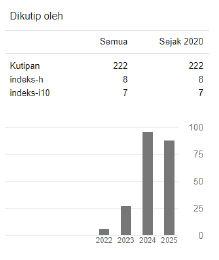Implementation of The Independent Curriculum in Enhancing Critical Thinking Skills of Senior High School Students in Bandar Lampung
 https://doi.org/10.54012/ijcer.v4i1.627
https://doi.org/10.54012/ijcer.v4i1.627
 Abstract views: 134
Abstract views: 134
 PDF downloads: 230
PDF downloads: 230
Keywords:
Critical Thinking Skills, Curriculum Merdeka, Project-Based LearningAbstract
This study was motivated by the imperative to strengthen critical thinking as a core competence within the Kurikulum Merdeka and by evidence that its implementation across senior secondary schools in Bandar Lampung remains uneven. The research focused on analysing how the Curriculum Merdeka contributes to the development of students’ critical thinking skills by examining classroom practices, teacher and student perceptions, and facilitating and inhibiting factors. A qualitative descriptive approach with purposive sampling was employed in three senior secondary schools (two public, one private), involving teachers, students and school leaders. Data were collected through semi-structured interviews, participant observation and document analysis (lesson plans and student artefacts) and were thematically analysed using Miles and Huberman’s framework, with source triangulation and member checking to strengthen validity. Findings indicate that the Kurikulum Merdeka creates opportunities for project-based and discussion-centred learning that can foster critical thinking, but its effectiveness is contingent upon teacher readiness, instructional leadership, infrastructure provision and students’ dispositions. The study recommends sustained pedagogical training, systematic institutional support and interventions to enhance student engagement and confidence; these measures carry implications for local policy and school practice in realising the Pelajar Pancasila profile.
Downloads
References
S. D. Brookfield, Becoming a critically reflective teacher, 2nd ed. San Francisco, CA: Jossey-Bass, 2017.
R. Dewi and N. Lestari, “Model pembelajaran berbasis masalah dalam meningkatkan keterampilan argumentasi siswa,” Jurnal Pendidikan Inovatif, vol. 8, no. 2, pp. 112–123, 2021.
R. H. Ennis, “Critical thinking across the curriculum: A vision,” Topoi, vol. 37, no. 1, pp. 165–184, 2018.
P. A. Facione, Critical thinking: What it is and why it counts. Millbrae, CA: Insight Assessment, 2015.
P. A. Facione, Critical thinking: A statement of expert consensus for purposes of educational assessment and instruction. Millbrae, CA: Insight Assessment, 2020.
A. Fitriani and D. Lestari, “Penerapan project-based learning untuk meningkatkan keterampilan berpikir kritis siswa SMA,” Jurnal Pendidikan Sains, vol. 9, no. 1, pp. 45–53, 2021.
M. Fullan, The new meaning of educational change, 5th ed. New York, NY: Teachers College Press, 2016.
M. Fullan and J. Quinn, Coherence: The right drivers in action for schools, districts, and systems. Thousand Oaks, CA: Corwin Press, 2016.
D. F. Halpern, Thought and knowledge: An introduction to critical thinking, 6th ed. New York, NY: Routledge, 2019.
U. Hasanah, “Iklim kelas inklusif dan pengaruhnya terhadap keberanian siswa menyampaikan pendapat,” Jurnal Pendidikan Karakter, vol. 12, no. 1, pp. 77–88, 2021.
A. Hidayat and B. Prasetyo, “Hubungan keterampilan pedagogis guru dengan kemampuan berpikir kritis siswa SMA,” Jurnal Penelitian Pendidikan, vol. 29, no. 3, pp. 201–214, 2022.
A. Kusuma and S. Rahayu, “Hambatan guru dalam implementasi Kurikulum Merdeka: Kajian literasi pedagogis,” Jurnal Pendidikan dan Kebudayaan, vol. 12, no. 4, pp. 321–332, 2022.
E. R. Lai and M. Viering, Assessing 21st century skills: Integrating research findings. Princeton, NJ: Educational Testing Service, 2017.
R. Nugraha, “Efektivitas implementasi kurikulum berbasis kompetensi dalam meningkatkan keterampilan berpikir kritis,” Jurnal Evaluasi Pendidikan, vol. 11, no. 2, pp. 98–107, 2020.
OECD, PISA 2018 results (Volume I): What students know and can do. Paris: OECD Publishing, 2019.
E. M. Rogers, Diffusion of innovations, 5th ed. New York, NY: Free Press, 2003.
J. W. Santrock, Educational psychology, 6th ed. New York, NY: McGraw-Hill Education, 2018.
M. Sari, “Pola belajar siswa dalam konteks pembelajaran abad ke-21,” Jurnal Pendidikan Humaniora, vol. 8, no. 1, pp. 33–41, 2020.
UNESCO, Reimagining our futures together: A new social contract for education. Paris: UNESCO Publishing, 2021.
L. S. Vygotsky, Mind in society: The development of higher psychological processes. Cambridge, MA: Harvard University Press, 1978.
A. Wahyudi, “Kepemimpinan instruksional kepala sekolah dalam implementasi kurikulum,” Jurnal Administrasi Pendidikan, vol. 26, no. 2, pp. 135–148, 2019.
H. Widodo and S. Kadarwati, “Project-based learning untuk meningkatkan kemampuan analitis dan evaluatif siswa,” Jurnal Inovasi Pendidikan, vol. 15, no. 3, pp. 211–220, 2020.
Downloads
Published
How to Cite
Issue
Section
License
Copyright (c) 2025 Destia Herlisya

This work is licensed under a Creative Commons Attribution-ShareAlike 4.0 International License.









